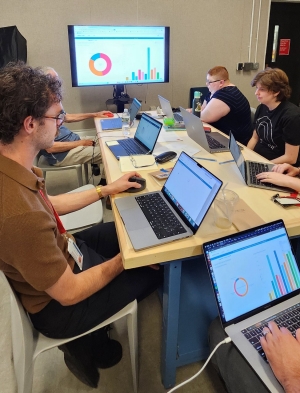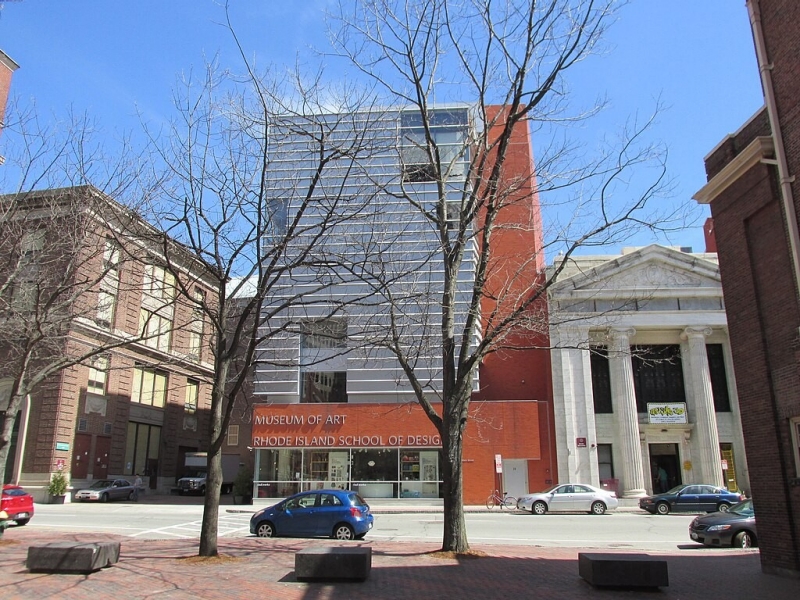Case study: A data empowered museum
This case study was developed by the Data for Good project team to share the range of activities and approaches taken by organizations that implemented a Data for Good program.
About the museum
The Museum at the Rhode Island School of Design (RISD) serves the Rhode Island community as well as visitors from around the world. In 2022-2023, the Museum saw close to 120,000 visitors. Their collections consist of more than 100,000 works of art and design dating from ancient times to the present, including paintings, sculpture, photography, prints, decorative arts, costume and textiles, and furniture.
The RISD Data for Good story

When the RISD Museum joined the Data for Good (D4G) initiative, they wanted to provide staff with the skills needed to ask questions of and visualize data. They were focused on changing how people thought about data and empowering staff to tell meaningful stories with it.
Staff at the Museum took part in two different D4G learning opportunities. A multi-week series focused on learning about Excel and Tableau facilitated for a larger group of staff, and then about a year later, a boot camp/refresher for a smaller group of staff. For some, this was their first real encounter with data beyond basic spreadsheets. As one RISD team member stated, “the class made data accessible, helping them think about trends and visitor behavior in new ways.” For the team, data became less about intimidating numbers and more about visual storytelling that could illuminate patterns, support decision-making, and even enhance visitor experiences.
This shift to viewing data as a storytelling tool had a significant impact on RISD’s museum culture. Rather than solely using data for end-of-year reports, they began to leverage it for dynamic insights that could adjust over time. For example, when the Washington Bridge in Providence, Rhode Island collapsed in 2023, the museum team used visitor data to explore if and how attendance was impacted by the disruption. They found that the effect was less severe than anticipated, giving them confidence in their programming choices and enabling them to better communicate this resilience to stakeholders.
As they learned to engage with data, RISD museum staff grew more curious and comfortable with it. This curiosity sparked what one team member described as a “data culture,” where departments across the museum began thinking critically about the information they were collecting. Staff from departments like Visitor Services and Education started asking questions about who they were reaching and where visitors were coming from. This shift was supported by leadership who, too, believed in the value of data and encouraged the team to keep pushing the boundaries of what they could learn and share.

Changing data mindsets
RISD staff outcomes were not just about using data more frequently; it was also about changing how people thought about data. For many team members, their experience with data had been limited or even discouraging—staff thought data was just “for the math people.” Through participation in D4G, they began to see data work as detective work, requiring curiosity and patience rather than technical mastery alone. It was about finding answers to meaningful questions rather than just calculating percentages. The mindset shift made data feel approachable and rewarding, fostering an inquisitive environment where all staff felt capable of engaging in data work.
What's next?
As RISD looks to the future, the museum plans to continue fostering this data culture. With more staff now empowered to make data-informed decisions, RISD Museum stands as an example of how embracing data can create a stronger, more adaptable organization. Their journey with Data for Good highlights the power of data to change not just operations but mindsets, enabling everyone to contribute to telling the museum’s evolving story.
Learn more
Additional Data for Good case studies from the Providence Public Library (RI), DeKalb County Public Library (GA), and Pottsboro Public Library (TX) are also available.
Project curriculum
The Data for Good curriculum is available for anyone to replicate and adapt into a training program in their community. The curriculum is a set of project-based lessons that guide adult or teen learners in achieving the skills they need to analyze data. There are 14 lessons, each with a lesson plan packet, slide decks, and activities for learners.
The curriculum is published under a Creative Commons license for anyone to reuse and repurpose.
